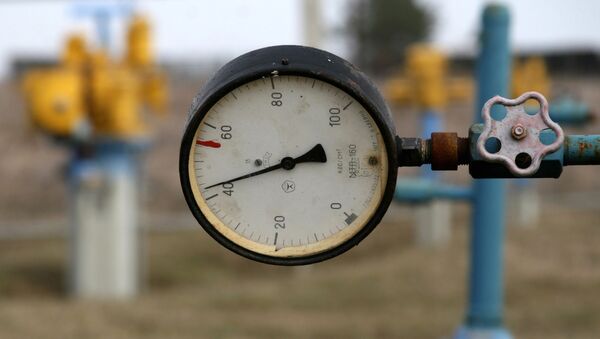On Monday, Russia has stopped gas supplies to Ukraine switching to deliveries to Kiev only upon prepayment. Speaking at a press conference Gazprom spokesperson Sergei Kupriyanov said this decision had been taken due to systematic failure of Naftogaz Ukraine to pay. "At the moment they've paid zero. Correspondingly, we deliver zero," he stated. Ukraine's gas debt to Russia amounts to $4.5 billion.
Sergei Kupriyanov stressed that gas deliveries to European countries through Ukraine will continue. "Volumes of gas for European customers will be fully met in compliance with their contracts. Naftogaz must ensure transportation to the delivery points."
Both Gazprom and Naftagaz have announced they are filing lawsuits with the Stockholm Chamber of Commerce Arbitration. Naftogaz is seeking $6 billion for Russia's 'unfair' gas prices that were set in 2010 under the then Prime Minister Yulia Tymoshenko. In its turn, Gazprom wants to receive $4.5 billion. It is also demanding compensation for Ukraine's failure to import natural gas under their take-and-pay contract with Gazprom over the past two years. The penalty in accordance with the contract could be around $18 billion.
The two countries can't seem to be able to find a mutually beneficial solution and one of the burning issues is the price. "Basically Ukraine wants a price as low as possible and have much lower obligations to take gas," says Danila Bochkarev, Brussels-based fellow with EastWest Institute's Global Security team. Ukraine is also concerned with the fact whether the price will be final or there will be an opportunity to amend it later.
At the moment it is difficult to say what price Russia and Ukraine will agree on, still the expert shares his estimate. "I would say that a reasonable price for Ukraine would be sort of a compromise between the two. The final price, I would think, would be around $350-360, that will be more or less an average price Gazprom gets in Europe minus the transit," the expert observes in an exclusive interview with Radio VR.
Another main point of contention is the conditions of the deal. For instance, the contract "has a take-or-pay clause which Ukraine, of course, wants to" take out.
Mr. Bochkarev also points to the fact that "there is the issue of transit via Ukraine. Russia is still dependent. It is paying quite a high price compared to other networks that it uses. That also puts it in dependence position vis-à-vis Ukraine."
Mr. Bochkarev believes that current situation is far from being critical from the Ukrainian point of view. Firstly, consumption is low during the summer season. Secondly, Ukraine has around 13 billion cubic meters of gas in the underground storage. And thirdly, the country's domestic production amounts to more or less 40% of its annual consumption. Note that gas consumption is not high at times of economic crisis, and Ukrainian industry is "very close to total collapse."
"So, basically from the point of view of gas balance, it wouldn't be as harmful to Ukraine, as it was in January 2009," the expert concludes.
Mr. Bochkarev alleges that Ukraine can easily survive on what it has "at least till the beginning of a new heating season in October" due to several reasons. The aforementioned low gas consumption during the warm months of summer has to be considered. Also keep in mind that the share of nuclear and coal energy is significant in Ukraine's energy mix. The expert also stresses "a lot of gas intensive industries are located in the de facto breakaway regions of Lugansk and Donetsk."
Current situation is quite comfortable not only for Ukraine, but also for the European countries, the expert points out. "Some of the gas which is currently transported via Ukraine can be shifted to the North Stream. As you know, North Stream due to some regulatory issues is not working at full scale."
Another important issue, according to Mr. Bochkarev, "is the Bulgarian gas system, which is currently being put to a halt." That resulted in Turkey, Bulgaria, and Greece not receiving gas from Ukraine due to the maintenance of Bulgarian transit network. Hungary and Slovakia might also be affected to an extent.
Overall Mr. Bochkarev is convinced that in Europe "this crisis wouldn't have any effect comparable to what we've seen in January 2009."

